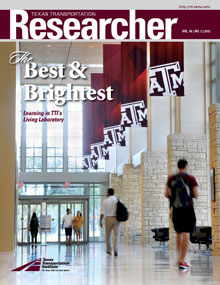Deeply Rooted Together in Education
One of the most robust relationships the Texas Transportation Institute (TTI) enjoys with Texas A&M University is through its partnership with the Department of Agricultural Economics (AgEco). There is, of course, an obvious transportation connection of getting food to market and all that entails. But the organizations’ respective roots are more closely tied than that.
In 1950 — the year TTI was established — the late Charley Wootan, who went on to be a director for TTI, graduated with an agricultural economics degree from Texas A&M. He joined TTI in 1956 as an associate research economist and became the Institute’s director in 1976. Under his leadership, TTI grew into the largest university-based transportation research agency in the nation.
Fast-forward to 2011.

Graduate student Alicia Israel was looking for a challenging project as part of her work on a master’s degree through AgEco. Her undergraduate degree in applied mathematics had little to do with transportation, so the project — which examined the transportation issues faced by rural elderly people — provided the opportunity to learn a new aspect of her chosen field.
“I grew up in Pleasanton, south of San Antonio, so I do have rural roots,” Israel says. “My mother has a courier business there and is often asked by elderly neighbors for rides to San Antonio. Although I had no background in transportation research, I knew this project was worthwhile and could help with quality-of-life issues that many people without access to public transit face.”
The Value of Non-medical Transportation for Improving the Quality of Life for the Rural Elderly is one of numerous TTI/AgEco joint projects funded by TTI’s University Transportation Center for Mobility™ (UTCM).
“The association we have with TTI is deep and rich,” Dr. John Nichols, head of AgEco, says. “These projects have helped us think outside the box and given us access to TTI sources that we would not have otherwise.”
Nichols likes the idea of bringing new people with different perspectives into projects. “As a result, our students and faculty members are using their talents in a lot of different ways. And that helps us grow as a department.”
Creating the opportunity for that growth did not happen by accident. In 2007, TTI Director Dennis Christiansen and Director Emeritus Herb Richardson formed an executive committee for the newly formed UTCM.
“Their vision was to have input from various people from across the university,” Nichols says. And he would know. Nichols has been a member of the committee since its formation.
“Dr. Nichols has been an invaluable member of UTCM’s executive committee,” UTCM Director Melissa Tooley says. “His participation is integral to our success. We appreciate his input and his enthusiasm for finding new ways to work together — it’s clear why Texas A&M has one of the most respected agricultural economics departments in the country.”
Among the other joint projects between UTCM and AgEco are:
- Improving Intermodal Connectivity in Rural Areas to Enhance Transportation Efficiency: A Case Study,
- Valuation of Buyout Options in Comprehensive Development Agreements,
- Bio-fuels Energy Policy and Grain Transportation Flows: Implications for Inland Waterways and Short-Sea Shipping,
- Statistical Analysis of Waterway Network Congestion: Causes and Costs, and
- Effect of Climate Change on Transportation Flows and Inland Waterways due to Climate-Induced Shifts in Crop Production Patterns.

With a strong history of working together on meaningful projects, the TTI/AgEco affiliation bodes well for the future of this partnership in education.
“The connection has certainly allowed us the chance to bring in graduate students and give them opportunities they would not have otherwise,” Nichols says.
As for student Alicia Israel, the South Texas native wrote her master’s thesis on the work she did on the joint TTI/AgEco rural transportation project. She is the first person in her family to go to college and, in May, graduated with her master’s degree.
“Before this project I did a lot of statistical analysis,” she says. “Now, I realize the human impact of the work we do. It was challenging, but it was an extremely rewarding experience.”

